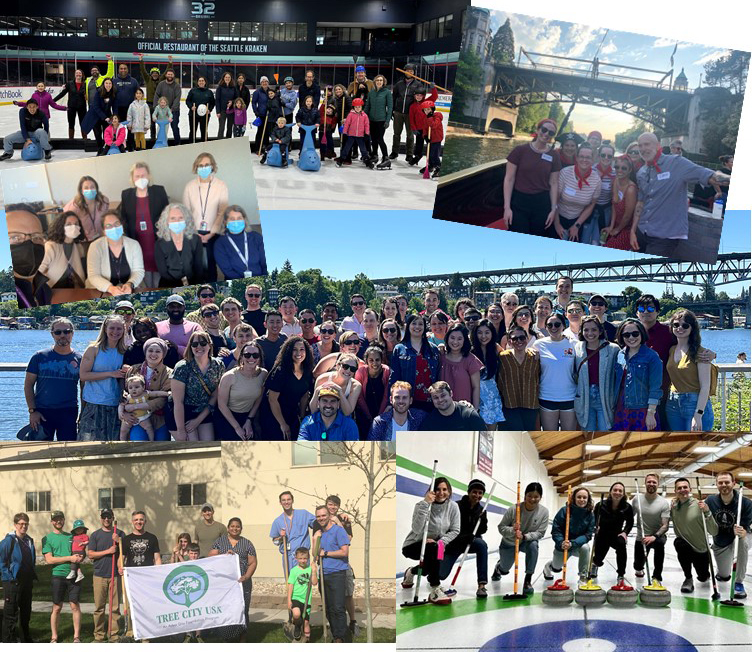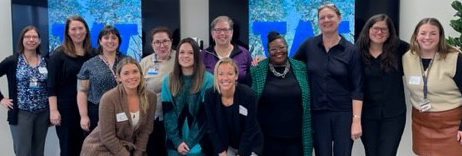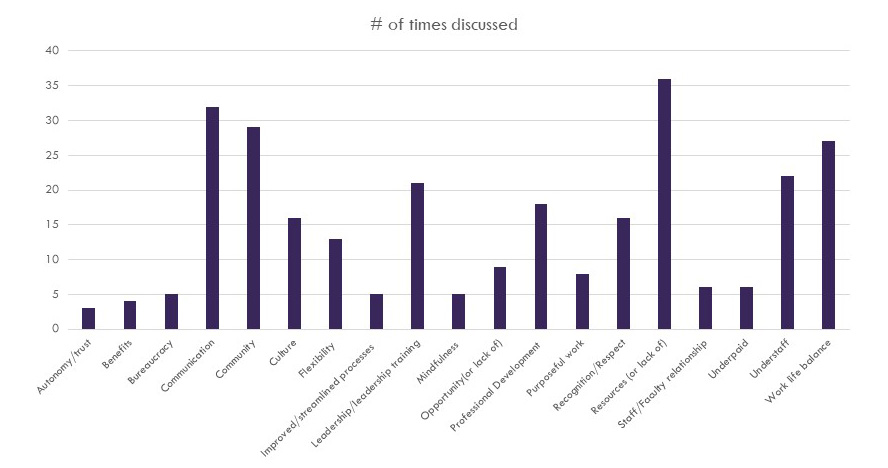
Spotlight on staff well-being
As part of our strategic plan, a dedicated working group composed of both staff and faculty was established to lead the department’s efforts to support well-being.
Supporting the well-being of our community is among the highest priorities of department leadership.
The Department of Medicine's well-being work group conducted four focus groups in March 2023.
A total of 24 staff members participated and represented a variety of divisions, roles, and lengths of service.
Standard qualitative analytic techniques were used to identify representative themes and illustrative quotes.
Some common themes and areas for improvement emerged.
Positive themes
When asked what contributes positively to staff well-being the common themes were:
Community
Staff like feeling connected to colleagues and leadership. They appreciate community-building events, in-person interactions, regular check-ins (virtual or in-person), connection with colleagues, support from colleagues and leadership, engagement and collaboration on projects, and affinity groups as positive ways to connect with our community.

Culture
Focus group participants were positive about the increased focus on well-being in the department and on the incorporation of mindfulness and wellness practices into meetings.
Work-life balance
Work-life balance (not working after hours/on vacation, healthy work boundaries, and leaders who demonstrate work-life balance) contributes positively to staff well-being.
Autonomy
Participants responded positively to trust from their supervisor(s) that allows for autonomy in their work.
Flexibility
While staff want to feel connected, they also want flexibility in their work schedules. They responded positively to guidelines rather than mandates around remote work. They mentioned that it is easier to focus and get work accomplished at home, but they miss the connection/community they used to have at the office.
Recognition
Positive feedback on performance and acknowledging the value of staff work are crucial to staff well-being.

Professional development
Staff responded positively to a dedicated and equitable fund for professional development, professional development events, leadership training, and peer-to-peer mentorship.
Leadership
Staff respect leaders who model boundaries and work-life balance. They appreciate check-ins with leadership, open communication, clear expectations, trust and autonomy, and leaders who understand staff workloads.
Purposeful work
Staff like being a part of a larger University of Washington community, interactions with patients and their families, events that give back to the community, and being helpful to their colleagues.
Areas for improvement
Communication
Staff do not like the sometimes disjointed flow and lack of transparency in communications.
Bureaucracy
The bureaucratic nature of the University of Washington and delays in action due to multiple levels of approval are viewed negatively and as a hindrance to work efficiency and well-being.
Diminished work-life balance
While remote work is highly valued by some, negative aspects include a lack of boundaries, and personal life events affecting work. There is also a burden on those employees who are on-site.
Faculty-staff relations
Staff mentioned negative themes of positional power, faculty unawareness of staff responsibilities and workloads, feeling unappreciated and their voices not being valued.
Lack of recognition
Staff would like work accomplishments to be celebrated, and mentioned that, while constructive feedback is important, a disproportionate amount of negative feedback has a detrimental effect on well-being.
Understaffing
Heavy workloads, disproportionate pay to workload, lack of backup/coverage, and lack of staff support for faculty were all noted as negatively affecting well-being.
Lack of resources
Staff noted that advocating for resources to effectively run our programs is challenging in a lean department, including resources to enhance well-being.
Lack of opportunities
Undefined career pathways and lack of growth or advancement opportunities for staff have a negative effect on staff well-being. It was noted that faculty have a clearer trajectory, roadmap and guidance for how to advance with the system.
Lack of diversity/inequities
A lack of diversity in leadership positions vs. staff roles was noted and this negatively impacts staff well-being.
Frequency of discussion topics
(positive and negative mentions combined)

Improving staff well-being
Some suggestions from the focus groups to improve staff well-being include:
- Education on staff roles
- Elevating staff voices
- Inviting speakers who are relevant to both faculty and staff
- Initiating Communities of Practice to facilitate connections for staff in similar job roles across divisions.
- More transparent and streamlined communication and more communication around wellness initiatives in the department.
- More ways to connect with leadership.
- On-site well-being offerings and department-specific well-being resources.
- Improved onboarding and succession planning processes and transparency/familiarity with HR processes.
- Equitable, established professional development funding, department-wide professional development training, more mentorship/coaching, more focus on staff advancement and promotion.
Current actions/initiatives
Communication
- All vacant division administrator roles are filled as of January 2024; backfilling these roles will help in communication flows, transparency, and connection.
- More communications are in place around well-being (reconnection events, quiet weeks, staff opportunities, award announcements).
Connection
- The Reconnection Fund was funded for a second year to foster more community-building.
 We started sponsoring an annual sporting event in 2023 to connect with each other outside of the office (2024 event TBA).
We started sponsoring an annual sporting event in 2023 to connect with each other outside of the office (2024 event TBA). - Communities of Practice to support community building and the development of best practices amongst staff in similar job roles will start in 2024 with grants managers and clinical trials. These pilots will be evaluated to possibly expand over time to other bodies of work.
- Engagement software (pulse surveys) will be used to track staff and faculty sentiments on topics like well-being and professional development over time. Planned launch in first quarter 2024.

Culture
- Increased communication from Barbara and Betsy around staff value to division leadership and entire department.
- We hired a DEI program manager to support strategic plan DEI workgroups and promote division-based DEI representatives and councils.
- Our department Bias Navigator program supports/guides faculty, staff, and trainees through instances of bias.
Recognition
- The Staff Spotlight series was created in 2020 to help us get to know each other, feel more connected, and learn about what others do in the department.
- We launched the Outstanding Staff Awards in 2023 to show department recognition of outstanding staff. The second round will launch in April 2024.
- The Staff Shout Outs program was launched in late 2023 to acknowledge staff accomplishments.
- The Gender Equity staff awards were created in 2022 to celebrate mentors and trailblazers.
- We have established a department initiative to put forward more UW Distinguished Staff Award nominees, starting with the December 2023 nomination deadline.
Professional development
- A Staff Professional Development fund ($10,000) has been created to support staff in seeking professional development opportunities.
- We helped to establish, and make up 20% of the mentors in the School of Medicine Mentorship Program and have had numerous mentees participate in this program.
- Development of defined staff career pathways and competencies are being developed by the strategic plan professional development subgroup, and we hosted a Gender Equity Lunch on career development and well-being initiatives for staff.
- A professional development staff resources page has been created on our public website.
Understaffing
- We have a large number of temporary pay increases (TPIs) in place to bridge gaps.
- We are partnering with a School of Medicine recruiter and are promoting job openings more broadly, including through social media channels.
- We are working on building a central DOM research administration team to bridge and support research administration gaps due to vacancies from local market competition.
- Larger divisions are hiring more associate administrators to help ensure business continuity and support for vacancies and leaves.
- A float AHR/HR position was created in the central department to support AHR/HR vacancies.
- We are utilizing discretionary leave and retention payments for retention.
- We are developing more equitable processes for recruitment & hiring and professional development, and advertising on multiple DEI sites for leadership positions.